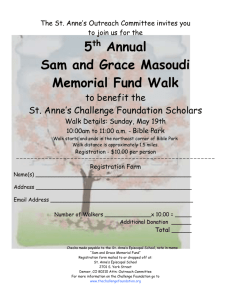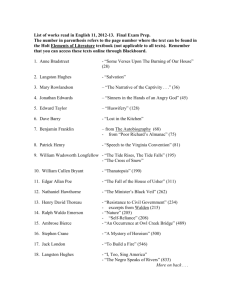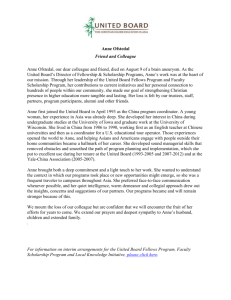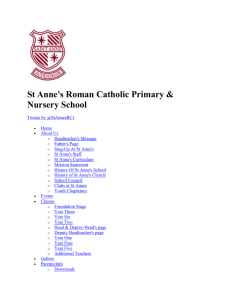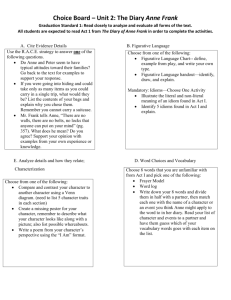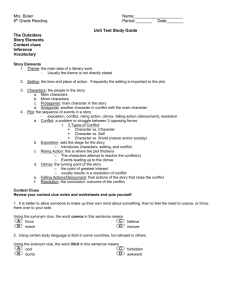Citation - Newcastle University
advertisement
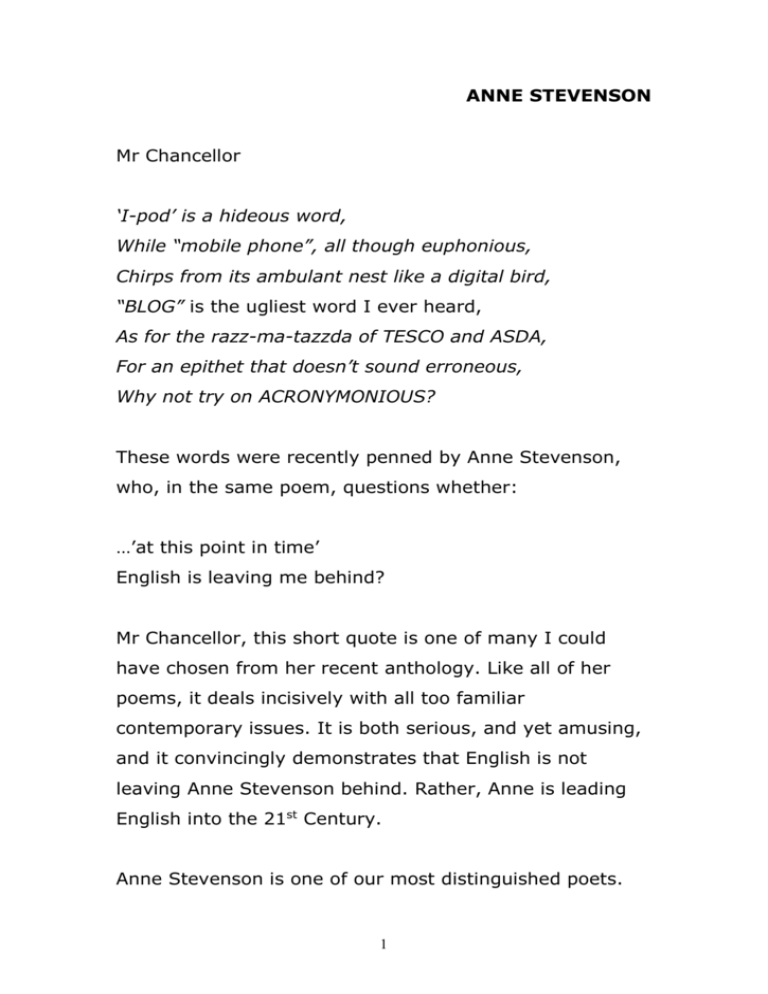
ANNE STEVENSON Mr Chancellor ‘I-pod’ is a hideous word, While “mobile phone”, all though euphonious, Chirps from its ambulant nest like a digital bird, “BLOG” is the ugliest word I ever heard, As for the razz-ma-tazzda of TESCO and ASDA, For an epithet that doesn’t sound erroneous, Why not try on ACRONYMONIOUS? These words were recently penned by Anne Stevenson, who, in the same poem, questions whether: …’at this point in time’ English is leaving me behind? Mr Chancellor, this short quote is one of many I could have chosen from her recent anthology. Like all of her poems, it deals incisively with all too familiar contemporary issues. It is both serious, and yet amusing, and it convincingly demonstrates that English is not leaving Anne Stevenson behind. Rather, Anne is leading English into the 21st Century. Anne Stevenson is one of our most distinguished poets. 1 She has written a wide and imaginative range of works using a formidable and characteristic technique. Her life has been dedicated to her written art, making her one of the most notable poets of her generation. Her work displays an unyielding seriousness about the art of poetry. Sometimes spare, it is always striking, and is distinguished by a clear-sighted grasp of the essential seriousness of the poet's vocation, leavened by a mischievous humour that never allows that seriousness to lapse into pomposity. Her highly-honed sense of craft cuts through clouds of modishness, and maintains a purpose rooted in both the stoic and the profoundly humane. A US native, she has made England her home, and this has underpinned her exploration and critique of the links between British and American English language poetry. New England and the North East seem to act as counterbalances in her bracing, always questioning work. Anne now lives at the top of one of the steepest hills in Durham, and how this came about is, in its self, a long and convoluted story. Anne’s parents were remarkable individuals. Her mother had been one of the first American women to study at college, and Anne was born in England whilst her father 2 was studying with Wittgenstien and GE Moore at Cambridge between the first and second world wars. Before Anne’s first birthday, the family returned across the Atlantic to another Cambridge, a journey that was to be the first of many trans-Atlantic voyages during her life. Anne was educated at the University of Michigan and began writing poetry in response to her research into the breakdown of Puritanism as a moral force. Marrying shortly after graduation, she returned to England, but found it stifling as a young mother, unable to vent her creative urge. Ironically, whilst she was in the depths of a creative block, great poetic events were unfolding in her mother-in-law’s kitchen. A widowed vicar’s wife, her mother-in-law packed every corner of her home with Bohemian students, including Lucas Myers and Ted Hughes. Myers and Hughes published a literary magazine named after the St Botolph’s Rectory, and Hughes met Sylvia Plath at the launch party, an highly significant event to be revisited in one of Anne’s greatest works of prose. Having returned to Michigan for graduate studies, she found a new lease of life, and came back to England to hold a Fellowship at Lady Margaret Hall in Oxford. There she mixed with a new generation of poets including our recent Poet Laureate Andrew Motion. Motion recognises 3 Anne’s role in “getting his first collection off the ground”, and in developing the scope of lyric poetry. In 1989 Anne published “Bitter Flame”, which was the first biography of Sylvia Plath to apportion equal blame in the failure of the relationship with Ted Hughes. The response in some quarters can only be described as a furore, but the work has stood the test of time. Having recently been described as “by far the most intelligent, and the only authentically satisfying” of all of the Plath biographies, the work demonstrates Anne’s ability to ignore the common wisdom, and (in the words of Andrew Motion) to “cut to the sense of things”. Anne moved to the North East of England in 1981 as a Northern Arts Literary Fellow 1981, and fortunately for us, she has not left since. She has published over 14 volumes of poetry. Many celebrate the nature, the landscapes and cultures of England and New England, drawing parallels between both. Her writing often deals with deep philosophy, drawing on a rich life experience to tackle profound topics such as the “meaning of life”. It is poignant, but not sentimental, and deftly intermingled with dry wit, and, as illustrated by the opening quotation, just a little “naughtiness”. 4 The musical flavour of her poetry is immediately apparent. Undoubtedly embedded in her musical background as an accomplished cellist and pianist, Anne recognises that a “some overheard musical rhythm or phrase sets me writing”, and until her late teens it was assumed that she would become a professional musician, not a poet. Mr Chancellor, although well into her seventh decade, Anne’s writing remains firmly connected with present times. English has not “left her behind”. Unlike many, her poetry peers believe that her writing gets better and better as the years pass by, drawing on her rich lifeexperience, which enables her to point out aspects of our world that most of us simply have not noticed. In her own words: Still, appearing ‘live’ at seventy has A tingling, clear, unsponsored compensation. Like fugue motifs in Bach, like flowering jazz, Those plummet lines of language, free of fashion, Reach to your deepest layer and won’t let go There, every minute tells you lightly, gently, The still sad music of humanity Is all we know, all we need to know. 5 In the words of our former Poet Laureate, Anne Stevenson is “one of the most individual poetic voices to have emerged on either side of the Atlantic in the last fifty years”. Inaugural winner of the Northern Rock Foundation award in 2002, her writing has attracted several accolades including a Lifetime Achievement award from the Lannean Foundation, which includes all the major writers in English. Despite her international reputation, and trans-global lifestyle, she has chosen to live here in the north east of England. She has tirelessly supported students at Our University through the Newcastle Centre for the Literary Arts, and generously supported the Northern Writers’ centre. By living and writing about our region for over three decades, she has made a major contribution to the rich culture we enjoy in the North East of England. Mr Chancellor, in recognition for her unique contribution to English literature… and the continued composition of “fugue motifs in Bach” and “flowering Jazz”,….and particularly for her ongoing support to our University, I ask that you bestow upon her the degree of Doctor of Civil Law, honoris causa. Citation by Professor Patrick Chinnery 6


